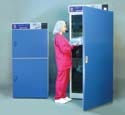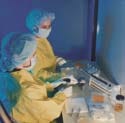June 17, 2005
Originally Published MPMN June 2005
Outsourcing Outlook
Sterilization
Sterilization Company Specializes in Small Loads
A company specializes in the sterilization of small loads for medical device manufacturers. A range of temperatures from 20° to 50°C is available, and 100% ethylene oxide is used. There is no chamber pressurization that may damage specialty or sensitive products. Items or devices from 0.1 to 15 cu ft can be sterilized. The company uses both chemical and biological indicators, provides validation services, and offers quick turnaround times.
Andersen Scientific Inc., Haw River, NC www.andersenonline.com
Customized Sterilization Service Offered
Medical device sterilization, including custom packaging and laboratory services and all necessary validation support, is available to customers nationwide. The company can provide as little as simply processing cycles or as much as complete turnkey validation. Each facility is ISO 13488 certified and complies with EN 550 and all applicable FDA requirements. Centurion Sterilization Services, Howell, MI www.centurionsterile.com
Company Expands Its Sterilization Services
An autoclave sterilization firm has expanded its services by installing a clean-steam autoclave. The Finn Aqua autoclave has a capacity of 260 cu ft. Features include flexibility in time, temperature, and pressure capabilities. The company also offers flexible-packaging sterilization, as well as validation services. Cytosol OEM, Lenoir, NC www.cytosol.com
Irradiator Processes Small and Large Runs
A provider of gamma sterilization uses an irradiator that can deliver a dose as low as 0.5 kGy for any density. The irradiator can process both large and small runs in temperature-controlled environments. It is suitable for AAMI validations and materials testing. The company uses a Kodak BioMax alanine dosimetry system. Same-day and overnight processing are available. CFC Logistics, Quakertown, PA www.cfclogistics.com
E-Beam Sterilization Facility Offers One-Step Process
A one-step process combines sterilization and improvements in product performance, extending wear, temperature, pressure, and chemical resistance. Packaged medical devices are sterilized and treated without the use of chemicals or additives. The degree of treatment is controlled by the dose level required to sterilize the product or to deliver the desired performance. A permanent cross-linking of the plastic material occurs during sterilization. This causes an improvement in tensile and impact strength, thermal stability, permeability of oxygen and other environmental gases, and resistance to solvents, chemicals, and abrasion. The process enables medical-device designers of molded parts, tubing, woven and nonwoven materials, and other biomedical products to substitute less costly materials and to reduce the size of their products while improving their performance. E-Beam Services, Cranbury, NJ www.ebeamservices.com
Copyright ©2005 Medical Product Manufacturing News
You May Also Like


